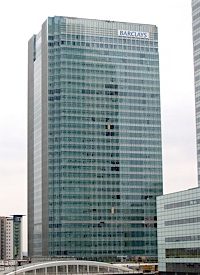
During a 2½ year period starting at the end of 2007, the Federal Reserve provided more than $16 trillion in secret bailouts to banks and other companies around the world, according to a government audit of some of the U.S. central bank’s operations.
Much of the Fed’s largesse was lavished on banks in Europe (such as Barclays, left) and Asia, the audit revealed. More than $3 trillion, for example, went to financial institutions in just five European countries. Trillions more flowed toward some of the biggest banks in America. Institutions from Brazil and Mexico to South Korea and Canada also benefited.
The 266-page report, produced by Congress’s non-partisan investigative service known as the Government Accountability Office (GAO), has already sparked intense outrage since its release on July 21. Fed apologists, however, have been quick to defend the actions, saying they were “necessary” to “save” the economy and justified under the Federal Reserve Act.
“The scale and nature of this assistance amounted to an unprecedented expansion of the Federal Reserve System’s traditional role as lender-of-last-resort to depository institutions,” the report stated.
Beyond the secret bailouts — to put the figure in perspective, consider that the output of the entire U.S. economy last year was well under $15 trillion — problems with conflicts of interest and no-bid contracts also featured prominently in the audit report.
One example highlighted by Sen. Bernie Sanders (I – Vt.) was the CEO of JP Morgan Chase serving on the board of the New York Fed even as his firm scooped up almost $500 billion from the central bank. The bank was simultaneously helping to administer the Fed’s secret bailouts.
But JP Morgan Chase was hardly the only example. According to the analysis, more than 80 percent of the Fed’s largest contracts to manage the programs were awarded without bidding.
Many of the companies that received the contracts were also being showered with central-bank bailouts at the same time. And more than a few insiders were granted “waivers” to hold investments in companies that were being rescued by the Fed.
“As a result of this audit, we now know that the Federal Reserve provided more than $16 trillion in total financial assistance to some of the largest financial institutions and corporations in the United States and throughout the world,” Sen. Sanders, a self-described socialist, said in a statement about the report. “This is a clear case of socialism for the rich and rugged, you’re-on-your-own individualism for everyone else.”
The congressional investigation was triggered as part of the financial “reform” bill passed last year despite strong Fed opposition. After the original “audit the Fed” bill by Rep. Ron Paul (R-Texas) passed in the House and became extraordinarily popular with Americans, Sen. Sanders helped ensure that only a watered-down version made it out of the Senate.
But even with what is known so far, critics are on the attack. Another report about the Fed is also due to be released in October of this year. And in recent months, other previously secret information about the Fed and its operations has come out following years of litigation.
All of the disclosures have fueled a growing anti-Fed movement aiming to eventually abolish the central bank – essentially a sort of banking cartel with private shareholders but some veneer of government oversight. Sen. Sanders suggested in his public statement, however, that the institution should merely be “reformed” to serve “working families” and not just Wall Street CEOs.
“No agency of the United States government should be allowed to bailout a foreign bank or corporation without the direct approval of Congress and the president,” he noted in the statement, perhaps not realizing that the Fed, by its own admission, is not an agency of the government. “No one who works for a firm receiving direct financial assistance from the Fed should be allowed to sit on the Fed’s board of directors or be employed by the Fed.”
The biggest single beneficiary of the Fed’s bailouts was Citigroup, which received about $2.5 trillion in assistance. Several other top banks in the United States, including Bank of America and Morgan Stanley also benefited to the tune of trillions of dollars. British bank Barclays PLC took close to $1 trillion.
The GAO report suggested that the Fed should implement better policies to deal with conflicts of interest. Its policies on awarding contracts, record keeping and risk management should also be revised, the agency recommended.
The Fed’s chief lawyer responded by saying that the central bank would “strongly consider” the advice. But for now — following bailouts to a bank owned by Libyan dictator Muammar Gaddafi, blatant and widespread market manipulation, wild money printing, and secret bailouts larger than the U.S. economy — analysts expect outrage to continue growing.
Photo: The Barclays Group is based in Canary Wharf in London’s financial district.



